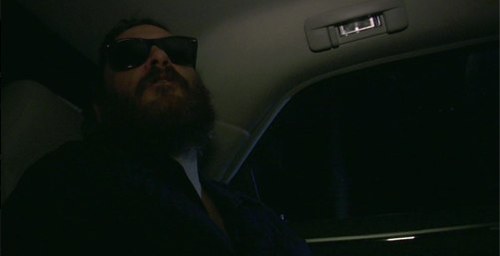There is one moment of true terror in I'm Still Here, Casey Affleck's dickish, realish account of his brother-in-law Joaquin Phoenix's "lost year," and it does not involve the whoring, coke-hoovering, excrement-eating or other Jackassery otherwise on copious display.
Near the end of the longest year I've spent in a theater in recent memory -- and after Phoenix's notorious Letterman appearance, an event that is positioned as the culmination of the actor's protracted career suicide -- Phoenix is shown performing in his new guise as a rapper at a Miami club. He barely has the energy to bomb; it's more like a shuffle-y, slurry fizzle. Affleck shoots the scene from the back of the club, so we get a doubled look at the stage: the audience is glued not to Phoenix but the monitors on the cameras they are holding up, like zombies worshipping at their sacrificial altar. A man is falling apart on stage while surrounded by blank faces and eager, feeding cameras: the void staring into the void. Was anybody actually there? And what was I looking at?
John Lennon had a lost year; I believe that's how he referred to 1975. Do you know why we don't have an excruciating video diary to mark each of his ever-deprecating nadirs? Because it was lost. You can read about it in your less reputable biographies, but Lennon himself and most of the people he caroused with never had much to say about it. It was a different time, true, and the interest in vivisecting celebrities was less keen, but Lennon was also quite open about his life. I think he knew -- as all of us do, on some level -- that his floundering into addiction, career uncertainty and infidelity comprised the least interesting year of his life.
Thirty-five years later, this stock chapter in the star narrative has been both privileged and downgraded: Once positioned as an artistic crucible, in the hyper-visual age it is simply fodder for spectacle. It would seem that Affleck and Phoenix decided to give the people exactly what the success of reality and tabloid entertainment shows suggests they want -- total, raging meltdown -- and invited them to kneel down and choke on it. There is certainly nothing remotely personal involved, despite opening footage of Phoenix as a boy, and even a brief shot of his big brother River, whose tragic self-destruction he was witness to and seems to be painfully pantomiming here.
The problem is, whether real, not real, or some Spector-headed stepchild of the two, meltdowns are still not inherently interesting. Nor are "statements" about "meltdowns" and the state of "celebrity culture" that use too much of the poison to concoct what they might hope to construe as an antidote. Both Affleck and Phoenix have been adamantly mum about their intent, and now I see why: I'm Still Here is structured largely as a vérité data dump, a floppy, ugly look at an actor in a tailspin of vile and/or pitiable behavior that we are invited to figure out as the participants dissolve behind a veil of artistic prerogative. I imagine the ensuing, divergent reactions (Misogynist! Genius!) will be incorporated into a performance prank that is very much ongoing. I also think that Affleck and Phoenix overestimated the interest anyone would have in assuming so much of this project's interpretive burden. I don't know about the rest of you, but I stopped guessing about 13 months ago, and this film did nothing to re-engage my interest.
"Satire is a lesson," Nabokov said. "Parody is a game." For the most part, I'm Still Here is neither, it's simply punishing blather. "Haven't you noticed the change in me, dude?" Phoenix rasps to one of his obsequious assistants ("If he wants to do something," one of them says, with wide, helpless eyes, "we do it"). "Isn't it f**king incredible?" From his first moments on screen, Phoenix is a suffocating, insufferable presence, a figure of dissolution and uncontainable, megalomaniacal rages. An arc is jammed into the film like an oversized coat hanger: Phoenix wants to be a rapper, he explains to P. Diddy (who, along with Ben Stiller, makes a painfully funny appearance), because hip hop feels real to him; Hollywood and acting are a "prison of characterization." He then becomes paranoid about an assistant leaking details about his "darkumennary" to the press. Quite justifiably insecure, he veers between clueless entitlement and crippling doubt, though they play like variations on the same note. Phoenix covers his lime green eyes with Orbison shades and obscures his beautiful, twisted features with a head-swallowing riot of hair. His figure slackens and distends; by the end of the year he appears to have entered his third trimester.
Affleck seems to want to split the difference between absolute vérité (he is credited as a cinematographer along with Magdalena Gorka, who along with a female producer is now suing him for sexual harassment) and footage manhandled for maximum ironical effect. A couple of witty moments bubble to the surface: Gorka's camera captures Phoenix's surprise red carpet announcement of his retirement from an obscured angle. Affleck then plays the tabloid-packaged version of the same announcement, complete with nasal, Guy Smiley voice-over. From this second angle we can see both Phoenix and Affleck clearly, and the latter is staring right into the reporter's camera, like he knows something we don't.
I mean, maybe, but I doubt it. And if he does, he was woefully unable to build it into this film, which revels instead in projectile puke, flopping penises, and graphic dump-taking, as if these are the new, indisputable signifiers not of base animal behavior but authenticity. My critical energies unengaged, I tried to tune into a different frequency. When I did, I felt a loathing radiating out from every frame, and before drawing out a healthy dose from my own ample stores in return, that loathing neutralized every other feeling I was willing to give.
